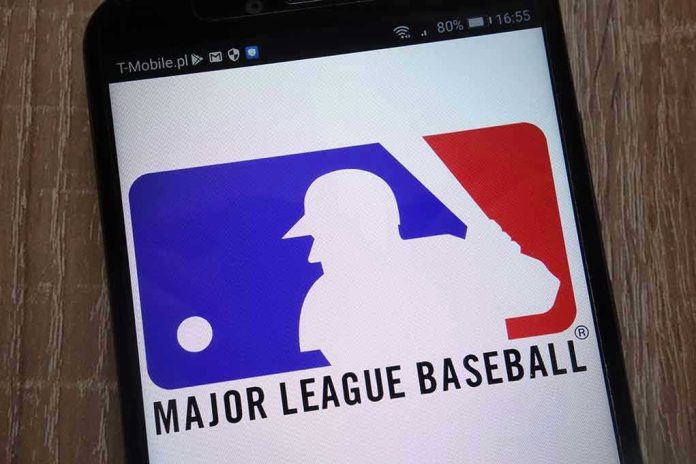
For the first time since the Black Sox scandal, Major League Baseball finds itself staring down the barrel of a criminal match-fixing case—with two All-Star pitchers accused of rigging pitches for profit, the very soul of America’s pastime is on trial.
Story Snapshot
- Federal prosecutors have indicted Cleveland Guardians stars Emmanuel Clase and Luis L. Ortiz for allegedly rigging pitches to enable fraudulent micro-betting profits.
- This is the first criminal match-fixing indictment involving active MLB players in over a century, with both facing up to 65 years in prison if convicted.
- The scheme focused on micro-bets, exploiting the rapid expansion and vulnerabilities of legalized sports betting platforms.
- The scandal has triggered a crisis of trust for MLB, sportsbooks, and fans, and could reshape the future of sports gambling oversight.
Modern Baseball’s Integrity Put to the Test by Micro-Betting Scandal
Federal indictments unsealed on November 9, 2025, revealed a plot that reads like a noir thriller: two of the Cleveland Guardians’ most talented pitchers, Emmanuel Clase and Luis L. Ortiz, stand accused of working with Dominican bettors to rig individual pitches during MLB games. Unlike the sweeping game-fixing schemes of the past, this operation targeted micro-bets—wagers on the outcome of a single pitch—an innovation of the sports betting boom that has outpaced regulatory safeguards. Prosecutors allege the players manipulated pitch outcomes, such as intentionally throwing balls, in exchange for bribes, while gamblers raked in between $400,000 and $700,000 in illicit winnings. The accused now face multiple felony charges, with the specter of up to 65 years behind bars if convicted.
The story’s timeline is as methodical as the scheme itself: Clase allegedly began collaborating with bettors in May 2023, exploiting his role as an All-Star closer. By June 2025, Ortiz joined the plot, with integrity monitors at MLB flagging suspicious betting activity shortly after. Both players were placed on paid leave during the summer of 2025, and the scandal broke wide open with the unsealing of indictments in November. Ortiz was apprehended at Boston Logan International Airport, while Clase’s whereabouts remain unknown, adding a fugitive’s intrigue to the unfolding drama.
Baseball’s Gambling Ghosts Haunt the Modern Era
The specter of gambling has haunted MLB for over a century, with infamous episodes like the 1919 Black Sox scandal and Pete Rose’s lifetime ban forming the sport’s cautionary tales. Yet, nothing in the league’s recent history compares to the dangers unleashed by the legalization and technological advancement of sports betting. Since the 2018 Supreme Court decision that opened the floodgates, micro-betting has surged in popularity—enabling wagers on pitch-by-pitch action and exponentially increasing the opportunities for manipulation. MLB’s 2024 suspensions for player betting signaled new risks, but the criminal indictment of active stars signals a seismic shift in the potential consequences for those who compromise the integrity of the game.
This scandal’s distinguishing features are stark: it is the first major criminal match-fixing case involving active players in modern MLB history, and it showcases how micro-bets—rather than full-game outcomes—can be exploited by those with inside access. The alleged involvement of a high-profile All-Star like Clase ensures that the fallout will be both sensational and instructive for the entire sports industry.
Power, Motive, and the Collapse of Trust in a Betting-Driven Age
Emmanuel Clase, described in court documents as the scheme’s central coordinator, is accused of leveraging his All-Star status to orchestrate the plot, allegedly recruiting Ortiz in June 2025. The pair’s motivations were seemingly straightforward: financial gain via bribes and kickbacks from bettors who placed fraudulent wagers using inside information. MLB, responsible for protecting the integrity of baseball, found itself racing against both the speed of the betting markets and the cunning of its own players. The federal case is being led by the Eastern District of New York, while the Cleveland Guardians—the players’ employer—face reputational fallout and uncertainty about the future of their roster.
The power dynamics are clear: MLB and federal law enforcement wield investigative and disciplinary authority, with the ability to impose lifetime bans and criminal sentences. The league’s quick detection of suspicious patterns and referral to prosecutors demonstrates the seriousness with which these allegations are being treated. Defense attorneys for both players maintain their clients’ innocence, promising a legal battle that could set precedent for how American sports address gambling-related corruption.
The Ripple Effect: What’s at Stake for Baseball and Beyond
The short-term implications are already unfolding. MLB and the Cleveland Guardians have suffered immediate reputational damage. Both accused players face the possibility of lifetime bans under the league’s infamous Rule 21, a rule that has haunted cheaters for generations. Legal sportsbooks, themselves beneficiaries of the post-2018 betting boom, may now face enhanced regulatory scrutiny and pressure to upgrade their fraud-detection protocols.
Fans, too, are left grappling with the erosion of trust in the fairness of the games they love. The broader economic impact could be significant, with potential losses for sportsbooks and possible ripple effects on MLB’s lucrative partnerships with betting companies. Politically, the scandal may force lawmakers and regulators to revisit the rules surrounding micro-betting and athlete integrity, especially as sports leagues grow increasingly entwined with gambling interests. This case could serve as a landmark, not just for baseball, but for the entire American sports landscape, as it confronts the unforeseen consequences of a gambling revolution that has moved faster than the guardrails meant to contain it.
Sources:
TexAgs forum summary of indictment and MLB response
NPR coverage and expert commentary
AS.com legal analysis and timeline






